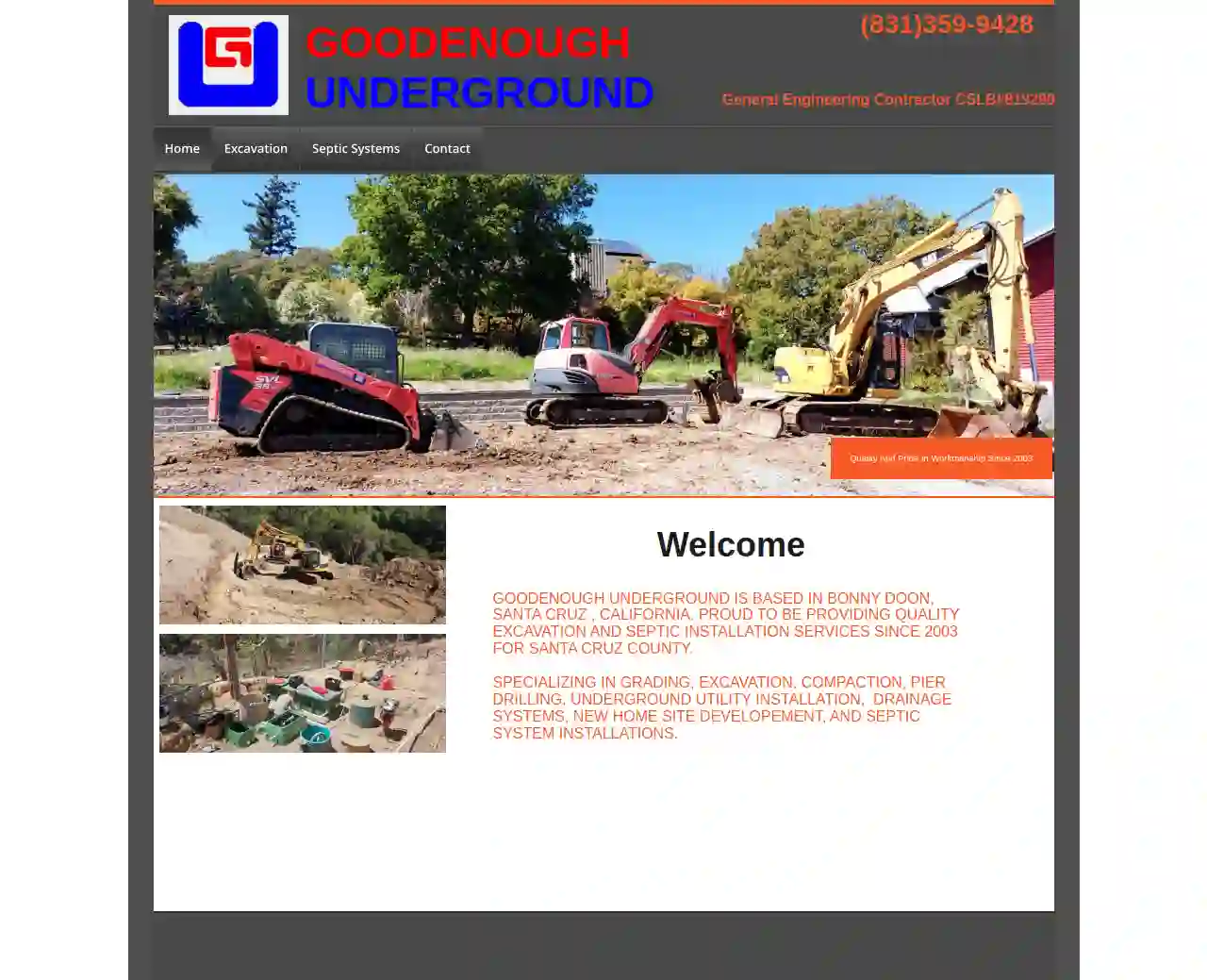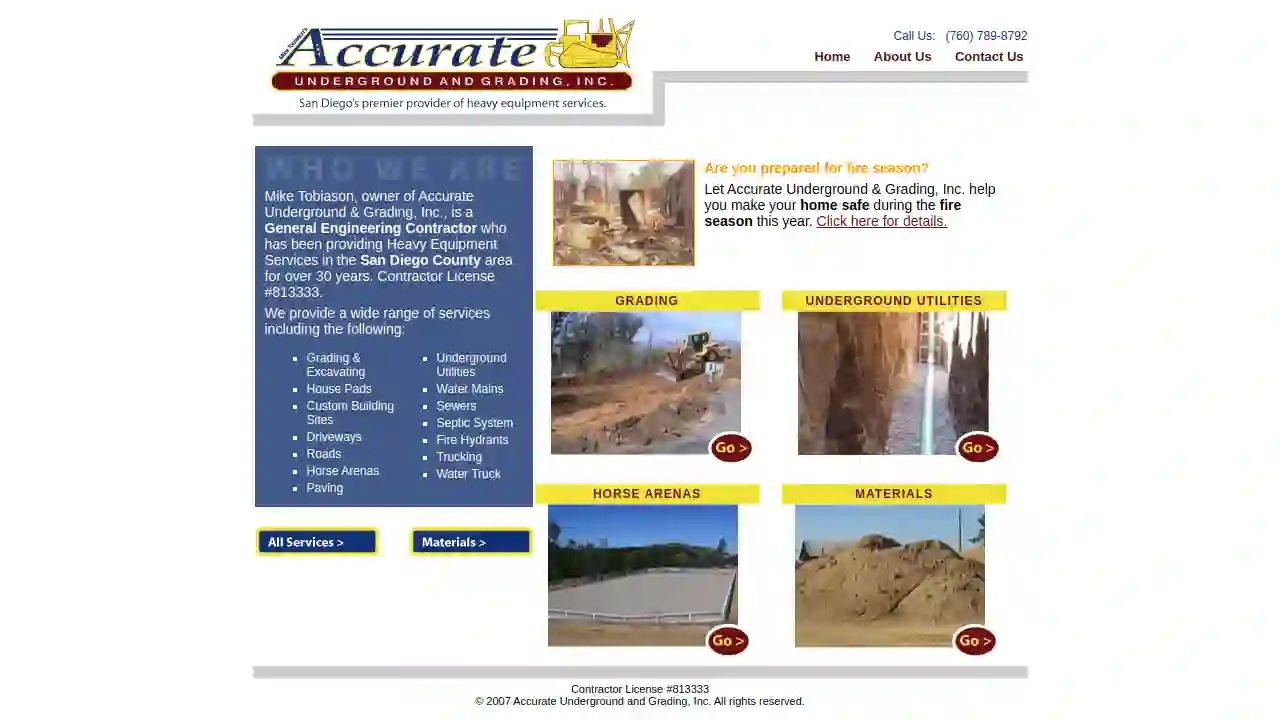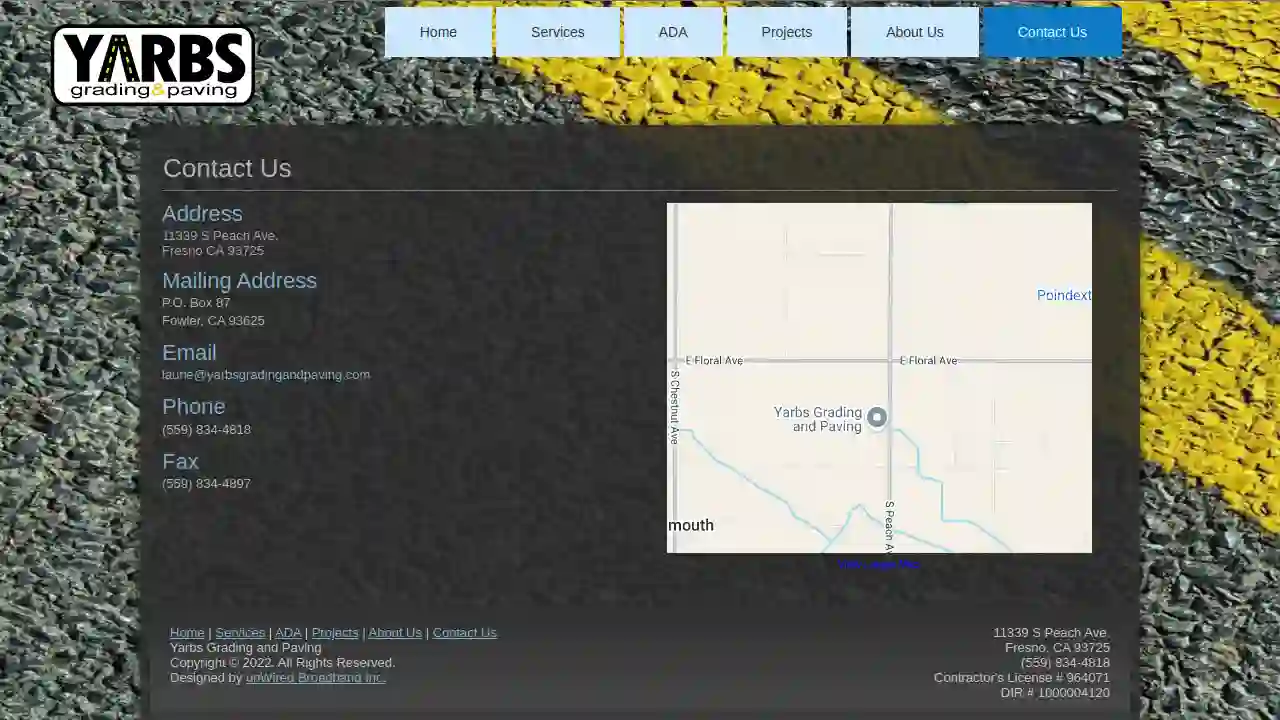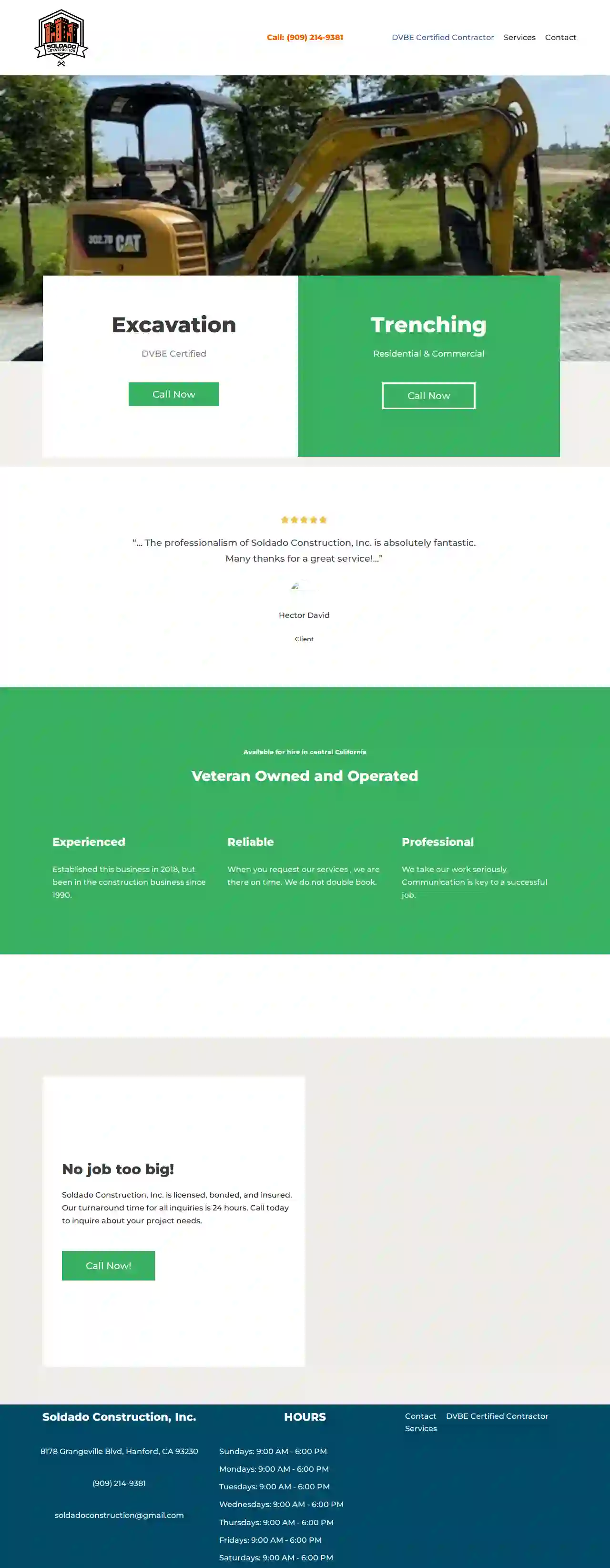Excavation Contractors Del Mar
Find the best Excavation Contractors Near Me in Del Mar
Get up to 3 Excavation Companies quotes for your project today! Compare profiles, reviews, accreditations, portfolio, etc... and choose the best service.

KR Land Development LLC: Land Clearing and Site Prep
516 reviewsOrange, USAbout KR Land Development At KR Land Development, our mission is to transform natural landscapes into safe, sustainable, and accessible spaces. With a deep respect for the environment and a commitment to efficiency, we provide expert land clearing services that pave the way for responsible land development. Our goal is to balance the needs of our clients with the preservation of nature, delivering innovative solutions that create a harmonious coexistence between humanity and the land. We are dedicated to improving the accessibility, safety, and utility of our clients’ properties while minimizing our impact on the environment. By aligning cutting-edge technology with eco-conscious practices, we aim to be leaders in the industry, leaving a legacy of well-cleared land and a healthier planet for future generations. Ready to Get Started On Your Land Clearing Project? We've Got You Covered! If you are looking to get started on your next land clearing project, we are here to help! KR Land Development offers free consultations to every client that is interested in our land clearing or property services. We are licensed & insured, protecting our clients and their property at all times throughout the land clearing process.
- Services
- Why Us?
- Gallery
Get Quote
GOODENOUGH UNDERGROUND INC.
57 reviewsBonny Doon, USGOODENOUGH UNDERGROUND IS BASED IN BONNY DOON, SANTA CRUZ , CALIFORNIA. PROUD TO BE PROVIDING QUALITY EXCAVATION AND SEPTIC INSTALLATION SERVICES SINCE 2003 FOR SANTA CRUZ COUNTY. SPECIALIZING IN GRADING, EXCAVATION, COMPACTION, PIER DRILLING, UNDERGROUND UTILITY INSTALLATION, DRAINAGE SYSTEMS, NEW HOME SITE DEVELOPEMENT, AND SEPTIC SYSTEM INSTALLATIONS.
- Services
- Why Us?
- Our Team
- Gallery
Get Quote
Accurate Underground & Grading
51 reviews1315 Walnut Street, Ramona, 92065, USAbout Us Accurate Underground & Grading, Inc. is a family-owned and operated business that has been serving the San Diego County area for over 30 years. Owner Mike Tobiason is a General Engineering Contractor with over 30 years of experience in the industry. Mike was born and raised in Ramona and started working with his father Angus at a young age. He learned the trade from the ground up, operating equipment and installing septic systems. In 1982, Mike started his own business, Accurate Underground & Grading, Inc. Since then, the company has grown into a thriving mid-sized excavating company, providing a wide range of services to residential and commercial clients. Our Commitment to the Community Accurate Underground & Grading, Inc. is committed to giving back to the community. We support many different community events, including the Ramona Boys & Girls Club, Grad-Nite, the Ramona Jr. Fair & Livestock Auction, Ramona Pony Baseball, Ramona Girls Softball, Poway Girls Softball, the Ramona 4th of July Fireworks, and the Ramona Lutheran School Playground. Our Team Mike and his team are dedicated to providing high-quality services to their clients. They are committed to safety, efficiency, and customer satisfaction. Accurate Underground & Grading, Inc. is a company that you can trust to get the job done right.
- Services
- Why Us?
- Our Team
- Gallery
Get Quote
Bul Hed Corporation
511 reviews4401 CR 640 West, Bartow, 33830, US2,720,137 Safe Hours Worked Bul-Hed Corporation is a leading provider of environmental construction and reclamation services. We have a proven track record of success in delivering high-quality, safe, and environmentally responsible projects. Our team of experienced professionals is committed to exceeding our clients' expectations and delivering projects on time and within budget. Company Highlights MSHA & OSHA Compliant “A” Grade in ISNetworld Avetta Compliant Since 2007: 11 gold, silver, bronze and honorable mention awards for Excellence in Safety Leadership and Performance from a Fortune 500 company. Recognized by the U.S. Secretary of Defense as a Patriotic Employer Awards from Amerisure Insurance for Safety Performance Recognized by the INTERNATIONAL SOCIETY OF MINE SAFETY PROFESSIONALS for Commitment to Safety
- Services
- Why Us?
- Gallery
Get Quote
Yarbs Grading and Paving
55 reviews11339 S Peach Ave., Fresno, 93725, USYarbs Grading and Paving: Your Trusted Partner for Quality Construction Yarbs Grading and Paving is a full-service grading and paving company located in Fresno, California. We have over 20 years of experience and are committed to delivering quality projects that meet or exceed our customers' expectations. We specialize in parking lot construction, ADA improvements, and city, county, and state roadway construction. Our team is dedicated to providing exceptional service and ensuring that every project is completed on time and within budget. We take pride in our work and strive to build lasting relationships with our clients. We offer a wide range of services, including: Concrete improvements Asphalt paving and overlays Mass excavation Underground Demolition Seal coating Striping We serve Fresno, Clovis, Madera, and the surrounding areas. Contact us today to discuss your project needs.
- Services
- Why Us?
Get Quote
Big Bore Drilling
4.828 reviews1522 W Pine, Fresno, 93728-1211, USWelcome To Big Bore Drilling Certified Septic & Hydroflushing Family owned and operated, since 1959, Big Bore Drilling has been providing septic system installation, pumping, repairs and certifications. We also provide hydro-flushing/hydro-jetting as well as boring & drilling services. Call today for a fast and free phone quote. We are located in Fresno California and service Fresno county, Clovis, Madera County, and surrounding mountain areas. Don’t put off a job that we make easy, affordable and delivered with quality. Our Services SEPTIC SYSTEM INSTALLATION & REPAIR SEPTIC TANK PUMPING TEST HOLES DRILLING LEACH LINES SEPTIC REPAIR DRAIN WELLS LIFT STATIONS ENGINEERED SEPTIC SYSTEM INSTALLATION CITY SEWER HOOK-UPS & REPAIR SEPTIC INSPECTIONS HYDROFLUSHING VACUUM DEBRIS REMOVAL HYDRO EXCAVATION
- Services
- Why Us?
- Testimonials
- Gallery
Get Quote
Eagle Asphalt - Asphalt & Paving Contractor
4.920 reviews4721 W. Jennifer Ave., #14, 4721 W. Jennifer Ave. #14, Fresno, 93722, USEagle Asphalt CA Eagle Asphalt proudly offers a wide range of services, we are your one-stop pavement and asphalt solution! Whether it be an asphalt overlay, new asphalt construction, or asphalt repair, Eagle Asphalt in Fresno, California has the experience and expertise to see the job through from start to finish. Give us a call… today! Eagle Asphalt in Fresno, CA is Locally Owned, Licensed & Insured. Serving Central Valley.
- Services
- Why Us?
- Our Team
- Testimonials
- Gallery
Get Quote
Soldado Construction | Excavating Trenching Hauling
51 reviews8178 Grangeville Blvd, Hanford, 93230, USSoldado Construction, Inc. Soldado Construction, Inc. is a Disabled Veteran Business Enterprise (DVBE) that provides excavation services for residential and commercial projects. We are committed to providing quality work at affordable prices. We have been in the construction business since 1990 and established this business in 2018. We are licensed, bonded, and insured. Our turnaround time for all inquiries is 24 hours. Call today to inquire about your project needs. Why Choose Soldado Construction? Experienced and reliable Professional and communicative No job too big or too small Free consultations and estimates Our Services Excavation Trenching Sewer Connections Demolition & Lot Clearing Our Commitment We are committed to providing our clients with the highest quality service and workmanship. We are also committed to being environmentally responsible and sustainable in our operations. We are proud to be a DVBE and to serve the Central Valley community.
- Services
- Why Us?
- Testimonials
- Gallery
Get Quote
Southern Excavation and Landscape LLC - Lawn Maintenance And Site work Contractor
530 reviews2028 Shepherd Rd #127, Mulberry, 33860, USSouthern Excavation & Landscape: Your Trusted Partner for Polk County's Landscaping and Excavation Needs Southern Excavation and Landscape is a well-established company located in Mulberry, Florida, USA. Founded in 2007 by Dakota Johnson, we have over 15 years of experience in the industry. Dakota's vision was to provide reliable and affordable lawn and landscaping services to the local community, and we've since expanded to include excavation services. In 2022, Waylon Cochran joined forces with Dakota to further elevate Southern. Waylon's expertise in business management has been instrumental in streamlining our operations and ensuring we deliver the highest quality work efficiently. We're committed to exceeding customer expectations and providing exceptional service. Southern Excavation and Landscape is a full-service company offering a comprehensive range of services, including: Lawn Maintenance Landscaping Excavation & Dirt Work And much more! We utilize the latest equipment and techniques to ensure projects are completed to the highest standards. Safety is paramount to us, and we prioritize the well-being of our employees and customers throughout every project. Our team of highly skilled and experienced professionals is dedicated to providing exceptional service to our clients. We work closely with you to understand your specific needs and preferences, ensuring your satisfaction is always our top priority.
- Services
- Why Us?
- Our Team
- Gallery
Get Quote
Urban Irvine Construction
56 reviewsSuite A, 16291 Construction Circle East, Irvine, 92606, USGrounded in a History of Excellence Southern California Grading was founded in 1969 by Bob Cutler and Bob Kehrer—two friends with extensive hands-on engineering and earthwork experience. In our early days, when Orange County was just starting to grow, we forged strong relationships with developers like the Irvine Company. Successful projects ranging from commercial ventures to developing new roads made Southern California Grading essential to bringing people and businesses to Irvine. These efforts began decades-long relationships with our clients and peers in the construction community. A Legacy of Teamwork and Mutual Respect Based in Irvine, California, Southern California Grading is still family-owned, and we pride ourselves on the core values of teamwork and mutual respect. Over the years, we have developed strong relationships with many clients and devoted employees. Some have been with us for over 25 years. Southern California Grading at a Glance $25 million in annual revenues Bondable and insured with an A+ rating Banks with one of the largest U.S. financial institutions Owns and rents its own fleet of heavy equipment Diverse market expertise Our Commitment to Excellence Our core principles of integrity, respect, responsibility and hard work have made us a premier provider of grading and construction services since 1969. We enjoy the challenge of navigating the ups and downs of our industry by focusing on client needs and adapting to industry advancements. A Firm Foundation for Success Today, Southern California Grading has a long history of successful projects throughout California. We’re proud of our reputation as a company that reliably provides a firm foundation for even the most complex building projects. Our experienced employees, technologically advanced equipment, and proven procedures provide assurance that the project will be completed on-schedule, within budget and done right, the first time.
- Services
- Why Us?
- Accreditations
- Gallery
Get Quote
Over 22,076+ Excavation Contractors on our platform
Our excavation companies operate in Del Mar and surrounding areas!
ExcavationHQ has curated and vetted the Best Excavation Companies near Del Mar. Find the most trustworthy business today.
Frequently Asked Questions About Excavation Contractors
- Spring and Fall: Often considered favorable due to moderate temperatures and drier soil conditions.
- Summer: Can be suitable, but hot weather can make working conditions challenging and might require additional measures (shade, hydration) for workers.
- Winter: Excavation in winter can be more difficult due to frozen ground, snow, and potential delays caused by inclement weather. It might also require specialized equipment or techniques.
- Project Size and Scope: Larger, more complex excavations naturally take longer.
- Soil Conditions: Rocky or challenging soil types can slow down progress.
- Site Accessibility: Limited access might require more time for maneuvering equipment and hauling materials.
- Weather: Inclement weather can cause delays.
- Permitting and Inspections: Waiting for permits or inspections can extend the timeline.
- Mechanical Excavation: Utilizing heavy equipment like excavators, backhoes, bulldozers, and loaders, suitable for most projects.
- Hand Excavation: Using hand tools (shovels, picks) for smaller excavations or delicate work near utilities.
- Blasting: Employing explosives to break up rock or hard materials, typically for large-scale projects.
- Hydro Excavation: Using high-pressure water jets to loosen and remove soil, often used for locating utilities or delicate excavation.
- Vacuum Excavation: Employing a vacuum system to suck up excavated material, suitable for safe excavation near utilities or in confined spaces.
What is the difference between excavation and grading?
Excavation: Primarily involves removing earth or other materials from a site. It's about digging down and creating space.
Grading: Focuses on shaping and leveling the ground to a specific slope or elevation. It's about adjusting the existing terrain.
For example, you might excavate a foundation and then grade the surrounding area to ensure proper drainage and a level surface for landscaping.
What is the best time of year for excavation?
How long does an excavation project take?
What are the different methods of excavation?
What is the difference between excavation and grading?
Excavation: Primarily involves removing earth or other materials from a site. It's about digging down and creating space.
Grading: Focuses on shaping and leveling the ground to a specific slope or elevation. It's about adjusting the existing terrain.
For example, you might excavate a foundation and then grade the surrounding area to ensure proper drainage and a level surface for landscaping.
What is the best time of year for excavation?
- Spring and Fall: Often considered favorable due to moderate temperatures and drier soil conditions.
- Summer: Can be suitable, but hot weather can make working conditions challenging and might require additional measures (shade, hydration) for workers.
- Winter: Excavation in winter can be more difficult due to frozen ground, snow, and potential delays caused by inclement weather. It might also require specialized equipment or techniques.
How long does an excavation project take?
- Project Size and Scope: Larger, more complex excavations naturally take longer.
- Soil Conditions: Rocky or challenging soil types can slow down progress.
- Site Accessibility: Limited access might require more time for maneuvering equipment and hauling materials.
- Weather: Inclement weather can cause delays.
- Permitting and Inspections: Waiting for permits or inspections can extend the timeline.
What are the different methods of excavation?
- Mechanical Excavation: Utilizing heavy equipment like excavators, backhoes, bulldozers, and loaders, suitable for most projects.
- Hand Excavation: Using hand tools (shovels, picks) for smaller excavations or delicate work near utilities.
- Blasting: Employing explosives to break up rock or hard materials, typically for large-scale projects.
- Hydro Excavation: Using high-pressure water jets to loosen and remove soil, often used for locating utilities or delicate excavation.
- Vacuum Excavation: Employing a vacuum system to suck up excavated material, suitable for safe excavation near utilities or in confined spaces.